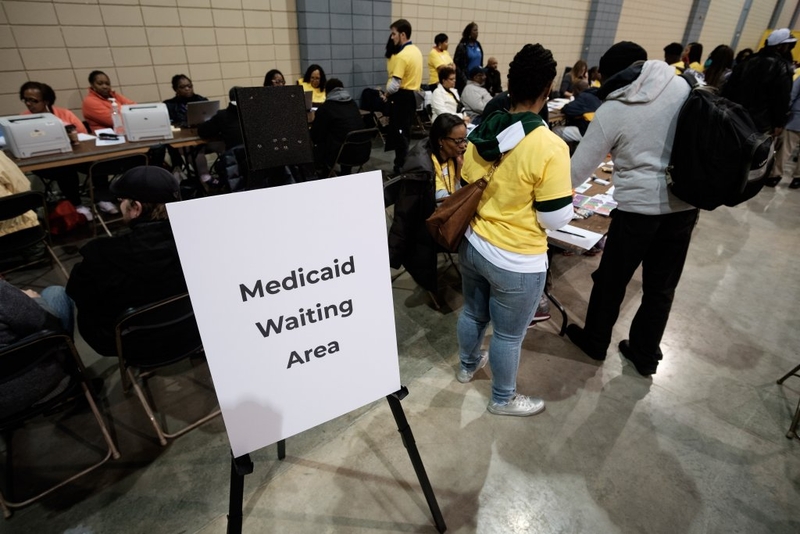Republican legislators in several states are focusing on Medicaid expansion as they rally behind President Donald Trump’s return to the White House and a GOP-controlled Congress intent on cutting spending for the public health insurance program designed for low-income individuals.
As federal officials consider potential cuts to Medicaid, several states are already moving to reduce or eliminate their expanded Medicaid programs.
In Idaho, lawmakers have introduced a bill to repeal the voter-approved expansion, while Montana Republicans are contemplating allowing their expanded program to expire. Some legislators in South Dakota are proposing to ask voters if the state should end expansion if federal funding decreases. Additionally, nine other states have laws in place that would automatically terminate their expansion programs if Congress cuts federal funding.
Meanwhile, discussions have stagnated in non-expansion states like Alabama, where lawmakers are waiting for direction from the Trump administration.
Many conservatives argue that Medicaid expansion imposes a significant financial burden on states and that relying heavily on federal funding is precarious. They contend that expansion diverts resources away from more vulnerable groups, such as children and individuals with disabilities, to low-income adults who could potentially find employment.
In South Dakota, where voters approved Medicaid expansion through a constitutional amendment in 2022, Republican state Senator Casey Crabtree is seeking to present the expansion to voters again via a trigger measure. He stated to Stateline that his proposed amendment would “empower voters to maintain financial accountability,” ensuring that if federal funding falls below the agreed 90%, the legislature can responsibly evaluate the state’s financial capacity and the impact on taxpayers while respecting the will of the people.
However, some Republicans express discomfort about the implications of repealing expansion for their constituents.
“I have received hundreds of emails from constituents urging us not to repeal. I have received zero requests to repeal, which is telling,” said Idaho state Representative Lori McCann, a Republican representing a competitive district in northern Idaho.
McCann indicated her interest in controlling Medicaid costs but remains skeptical about a complete repeal. According to the Idaho Department of Health and Welfare, more than 89,000 Idahoans could lose their coverage if the state revokes its expansion. She noted that only a small fraction of those affected would qualify to purchase discounted insurance through the state exchange.
“What will happen to the rest? They will end up in emergency rooms again, and we’ll face the same issues we had before Medicaid expansion,” she warned.
Prior to President Barack Obama signing the Affordable Care Act (ACA) into law in 2010, traditional Medicaid primarily served children, caregivers, individuals with disabilities, and pregnant women. The ACA’s Medicaid expansion allows states to cover adults earning up to 138% of the federal poverty level—approximately $21,000 annually for a single person—with the federal government covering 90% of the costs for these newly eligible individuals.
All but 10 states, most of which are controlled by Republicans, have accepted this deal. Nationwide, over 21 million low-income individuals rely on expanded Medicaid for health insurance.
As the Trump administration and a Republican-controlled Congress consider options for reducing Medicaid, they are seeking funding to sustain tax cuts implemented during Trump’s first term. Proposals include lowering the federal 90% funding match, which could shift more Medicaid expenses to the states, and introducing new requirements such as work mandates for enrollees.
The uncertainty at the federal level is fueling efforts by Republican state lawmakers who have long opposed the program, despite its popularity.
In a public address last month, Arkansas Governor Sarah Huckabee Sanders, a Republican, announced the state would seek federal approval to impose work requirements on adults to qualify for coverage.
“If you want free healthcare—funded by your fellow taxpayers—able-bodied, working-age adults need to work, attend school, volunteer, or be home caring for their children,” she stated.
Sanders argued that coverage without such requirements discourages work and self-sufficiency.
However, advocates and experts point to extensive research linking Medicaid expansion to reduced uninsured rates, improved health outcomes, and economic benefits for states, hospitals, and providers.
Without expansion, many working poor individuals who lack employer-sponsored insurance find themselves in a coverage gap: they earn too much to qualify for traditional Medicaid but not enough to afford private insurance. Expansion helps bridge this gap.
Advocates warn that stripping health insurance from tens of thousands in a state would have severe repercussions for families, hospitals, and state budgets.
“It would be disastrous for everyone at all levels of the state,” said Idaho Democratic state Representative Ilana Rubel, the House minority leader, who serves on the committee evaluating bills that could repeal the state’s Medicaid expansion.
“We would revert to a situation where people cannot seek preventive care until it’s too late, leading to health crises and financial ruin.”
A Coordinated National Effort
Many of the efforts to repeal Medicaid expansion in states like Idaho and Montana are coordinated by national conservative-backed organizations, according to Joan Alker, executive director of Georgetown University’s Center for Children and Families.
“It’s essential to recognize that this is part of a well-orchestrated and financed campaign to undermine Medicaid, particularly for adults,” Alker stated. She is also a research professor at Georgetown’s McCourt School of Public Policy, where her research focuses on Medicaid and the Children’s Health Insurance Program.
Conservative think tanks, including the Foundation for Government Accountability and the Paragon Health Institute, have testified against Medicaid expansion in several state legislatures and have actively worked to thwart state ballot initiatives.
In Montana, where Medicaid expansion is set to lapse this year unless renewed by the legislature and governor, representatives from the Foundation and the Institute urged state lawmakers to abandon Medicaid expansion. Montana Republican state Representative Jane Gillette, a dentist, appeared in a video produced by the Foundation advocating for allowing the expansion to expire.
Neither organization responded to interview requests.
Last year in Idaho, state Representative Jordan Redman, a Republican, allocated most of his time introducing his Medicaid bill to a representative from the Foundation for Government Accountability. That bill ultimately failed to progress out of committee due to significant public opposition.
“Repeal in Sheep’s Clothing”
This month, Redman revived his Medicaid bill, which would repeal the expansion next year if the federal government fails to maintain the 90% funding match, and if the state does not receive federal approval to implement work requirements and other new restrictions, including a cap of 50,000 on expansion enrollment—just over half of its current enrollees—and a three-year limit on benefits.
“This safeguard approach will strengthen Idaho’s Medicaid program while allowing flexibility,” Redman told the Idaho House Health & Welfare Committee earlier this month. “If the federal government or state agencies do not meet the program’s safeguards, this legislation ensures that Medicaid funds will be redirected to serve those in genuine need.” Redman did not respond to a request for an interview from Stateline.
Rubel, the Democratic leader, characterized Redman’s bill as “Medicaid repeal in sheep’s clothing.”
“It’s a trigger law with conditions that are highly unlikely to be met,” she asserted. “Basically, they’re saying unless you can fly a unicorn to the moon and back, Medicaid expansion will be repealed.”
Idaho voters approved Medicaid expansion via ballot measure in 2018, with nearly 61% in favor. The law took effect in 2020.
Since then, conservative lawmakers in Idaho have attempted, without success, to repeal Medicaid expansion, including introducing another repeal bill last month. However, this may be conservatives’ year. Before the session began, Idaho’s Republican House Speaker expanded the committee from 13 to 15 members. Some state Democrats argue this was an attempt to push through a Medicaid expansion repeal. At least eight committee members have pledged their support for the Idaho Republican Party’s platform, which calls for the repeal of Medicaid expansion.
Medicaid enjoys national popularity, both in expansion and non-expansion states. A January 2025 health tracking poll from KFF, a health research organization, revealed that three-fourths of Americans view Medicaid favorably. This sentiment transcends political affiliations: 63% of Republicans, 81% of independents, and 87% of Democrats express favorable views.
Polling in Idaho in 2023 indicated that 75% of voters, including 69% of Republican voters, held a favorable view of Medicaid.
“Citizens should not have to struggle this hard to secure something they want and need, and then continually urge legislators not to take it away again,” Rubel stated.
Trigger Laws
If Congress reduces the federal match rate for Medicaid expansion from the current 90%, more than 3 million adults could immediately lose their health coverage.
This is because nine states have implemented so-called trigger laws that would automatically terminate Medicaid expansion if federal funding is cut: Arizona, Arkansas, Illinois, Indiana, Montana, New Hampshire, North Carolina, Utah, and Virginia. Three additional states—Iowa, Idaho, and New Mexico—would require the government to adopt cost-saving measures to mitigate the impact of federal cuts.
Alker is skeptical that Congress will be able to pass such legislation before most state legislative sessions conclude this spring. However, if cuts are made, the effects may start appearing in 2026.
Regardless of potential federal cuts, states such as Arkansas and Idaho are exploring ways to limit the number of Medicaid-eligible individuals by implementing work requirements or benefit caps.
States must seek federal approval to impose additional conditions on Medicaid eligibility.
The first Trump administration approved work requirements in 13 states, but the courts later struck those down, and the Biden administration denied similar requests. States like Arkansas are trying again, hoping to achieve a more favorable outcome under the new Trump administration.
Redman informed Idaho legislators that he anticipates the Trump administration will approve the necessary waivers for his proposed bill.
“I’ve spoken with several individuals in the new federal administration, and they indicated they are looking for unique and creative waivers that they want to grant,” he stated.
Meanwhile, Republican lawmakers in non-expansion states have warmed to the idea of expansion in recent years. It was a significant issue during last year’s legislative session in solidly red Mississippi, supported by Republican Lieutenant Governor Delbert Hosemann. Expansion is being reconsidered this year, although lawmakers have indicated they will not entertain a plan unless it includes work requirements.
However, last month in Alabama, House Speaker Nathaniel Ledbetter, a Republican, stated that expansion would not be a priority this session due to anticipated changes at the federal level regarding Medicaid.
“I think we are better off waiting to see what they will do,” he told reporters.


